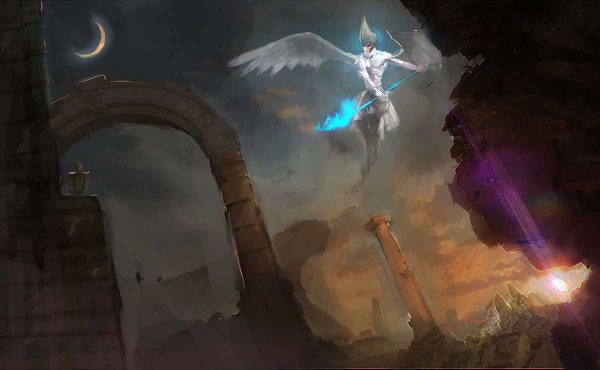
Archangel Michael comes to the rescue.
“I have seen the angel of the LORD face to face!” (Judges 6:22)
God (YHVH) has been making appearances to His creation from the time He walked in the Garden of Eden in the cool of the day in Genesis 3:8.
These appearances are known as theophanies, a word derived from the Greek theo (God) and phaino (to appear).
These theophanies in the Bible are clearly appearances of Elohim and YHVH — the Creator of the Universe and everything in it.
He appeared to Moses in a burning bush and to the children of Israel in a pillar of fire and a cloud of glory.
And the Prophets Ezekiel and Isaiah both saw Him sitting on His throne!
But we can’t always know for certain when it is God appearing or when it is one of His created angelic beings.
Here are some things we can look for to help us discern the difference so we can read God’s Word more accurately.
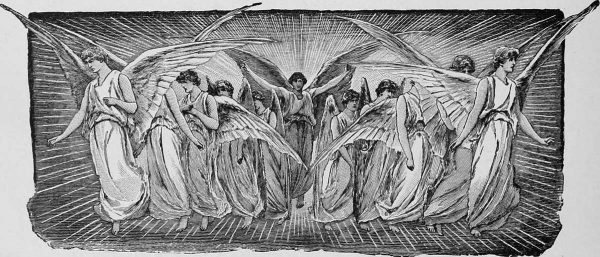
Angels, (illustration from T. DeWitt Talmage: his life and work, p. 500)
Angels Have Many Roles and Titles
Throughout Scripture, we see angels referred to by some of these titles:
-
- Messengers (Daniel 4:13)
- Watchers (Daniel 4:17)
- Military “hosts” (1 Samuel 17:45)
- Bnei Elohim: Sons of God or Sons of the Mighty (Genesis 6:2; Job 2:1; Psalm 89:6)
- Angel of God / Angel of the LORD
However, the title angel of the Lord — (in Hebrew, Malach YHVH or Malach Elohim) — often confuses readers because this angel can be the appearance of God Himself.
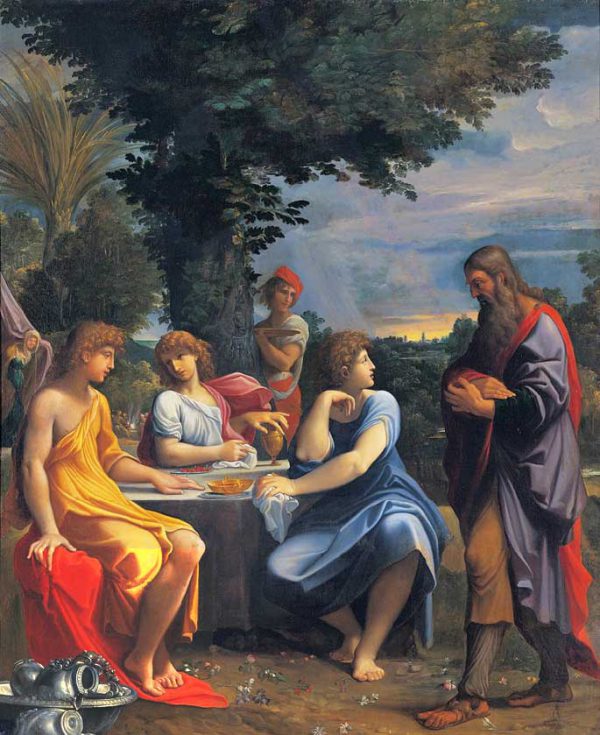
Three angels hosted by Abraham, by Ludovico Carracci (1555–1619). One of these angels turned out to be YHVH God Himself (Genesis 18:22).
There are multitudes of English Bible translations with various renderings.
In some English translations when the Hebrew term “angel of the Lord” refers to a created angel, the Bible translators write it as “an angel of the Lord.” And when it refers to an appearance of God Himself, they might write it as “the angel of the LORD.”
But this is not true among all translations, and even within some Bible translations the presentation is not consistent. Therefore, we cannot rely on capitalizations of the word “Lord” to help us understand whom the Scriptures are speaking of.
However, we can be sure an angel of the Lord is God when one of these occur:
1. The angel declares Himself to be God as He did in the burning bush of Exodus 3:2–5.
In this situation, the angel of the Lord (malach YHVH) appeared to Moses in flames of fire from within a bush:
“Do not come any closer,” God said.“ Take off your sandals, for the place where you are standing is holy ground.” Then he said, “I am the God of your father, the God of Abraham, the God of Isaac and the God of Jacob.” At this, Moses hid his face, because he was afraid to look at God (Elohim).”
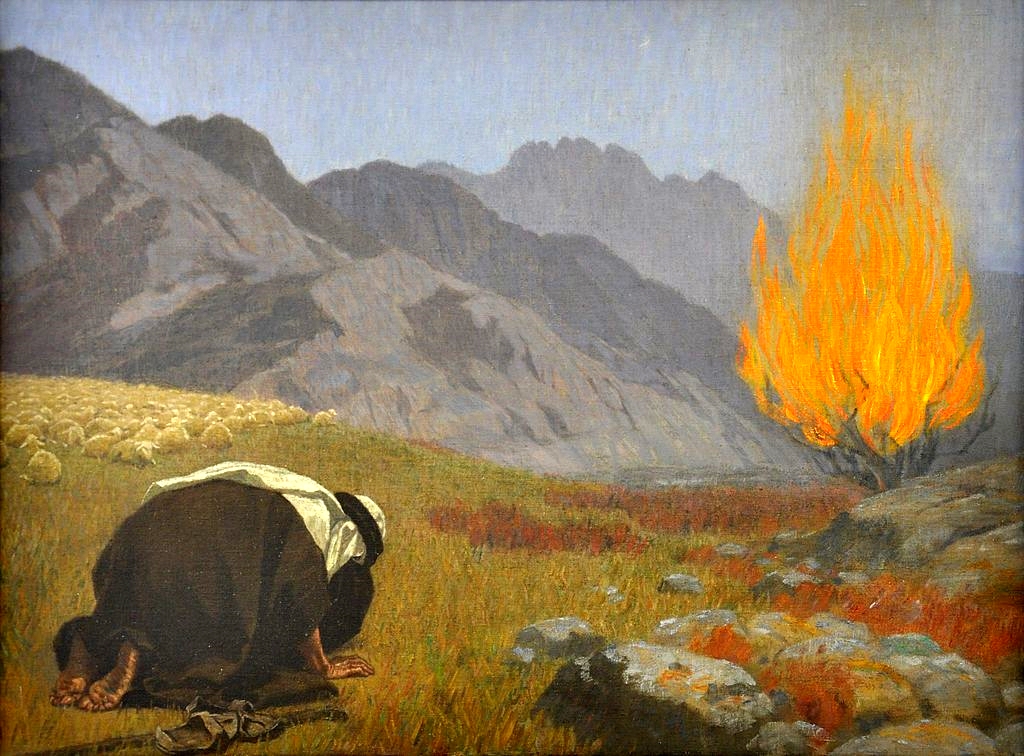
Moses and the Burning Bush (1920), by Gebhard Fugel
2. The person sees the angel who appears as a human being and declares that the angel is God Himself, such as in the Books of Genesis or Judges:
Genesis 32:24–30:
“So Jacob was left alone, and a man (eesh) wrestled with him till daybreak.” (verse 24)
“So Jacob called the place Peniel, saying, “It is because I saw God (Elohim) face to face, and yet my life was spared.” (verse 30)
In this case, Jacob declared that he saw God, though it says that he wrestled with a man (eesh).
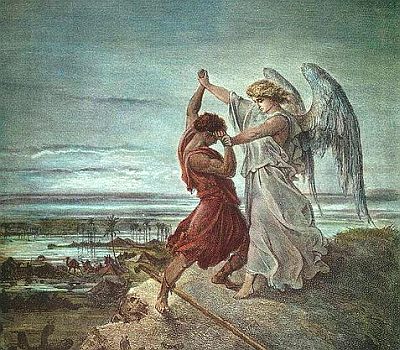
Jacob Wrestling with the Angel, by Gustave Dore, which turned out to be God Himself.
Judges 13:11–22:
“Manoah got up and followed his wife. When he came to the man (eesh), he said, “Are you the man who talked to my wife?” “I am,” he said. (verse 11)
Manoah realized that it was the angel of the Lord (malach YHVH). “We are doomed to die!” he said to his wife. “We have seen God (Elohim).” (verses 21-22)
In this case, Manoah declared that he saw God, though it says that he spoke to a man (eesh).
Beyond these two points, we have to rely on some general principles that angels operate under, and then decide if the angel of the Lord in a passage is God or one of His holy messengers.
So, let’s look at some of those principles.
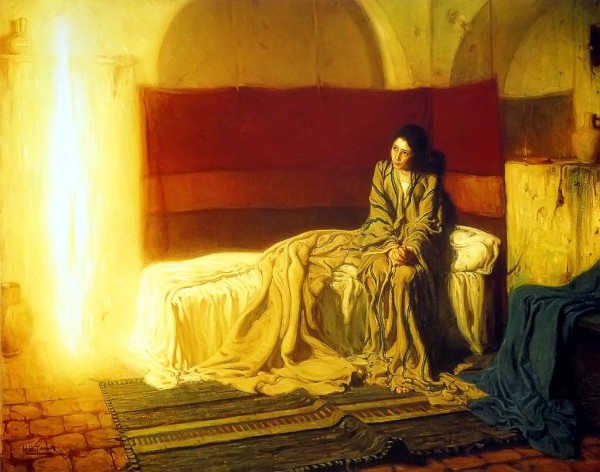
The Annunciation, by Henry Ossawa Tanner (1898), depicts Miriam (Mary) receiving the message from Angel Gabriel of her conception.
Angels are messengers for God.
Angels often deliver messages that encourage, warn, or prepare people.
The Angel Gabriel told Daniel, “I have now come to give you insight and understanding.” (Daniel 9:22)
He came to tell Daniel about the prophecy of the Seventy Sevens, which helps the reader identify the time period when the Messiah would come.
But the Angel Gabriel didn’t devise this prophecy on his own — that is God’s domain. Gabriel was sent by God as the “messenger.”
The Hebrew word malach can mean either angel or messenger.
“As soon as you began to pray, a word went out, which I have come to tell you, for you are highly esteemed. Therefore, consider the word and understand the vision.” (Daniel 9:23)
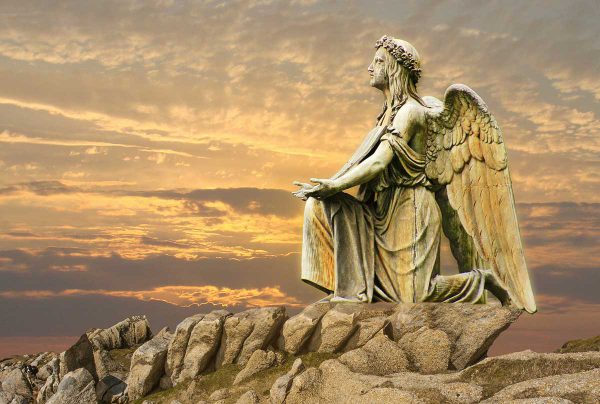
Are They Angels, Theophanies, or Christophanies?
Angels are not to be worshiped.
Angels were created to glorify and worship God the Father and God the Son; only God receives worship.
“When God brings His firstborn into the world, He says, ‘Let all God’s angels worship Him.” (Hebrews 1:6)
Just as the angels were worshiping Yeshua when He was here on earth, the angels are continuously worshiping God in heaven.
Day and night, they never stop saying, “Holy, holy, holy is the Lord God Almighty, who was, and is, and is to come.” (Revelation 4:8)
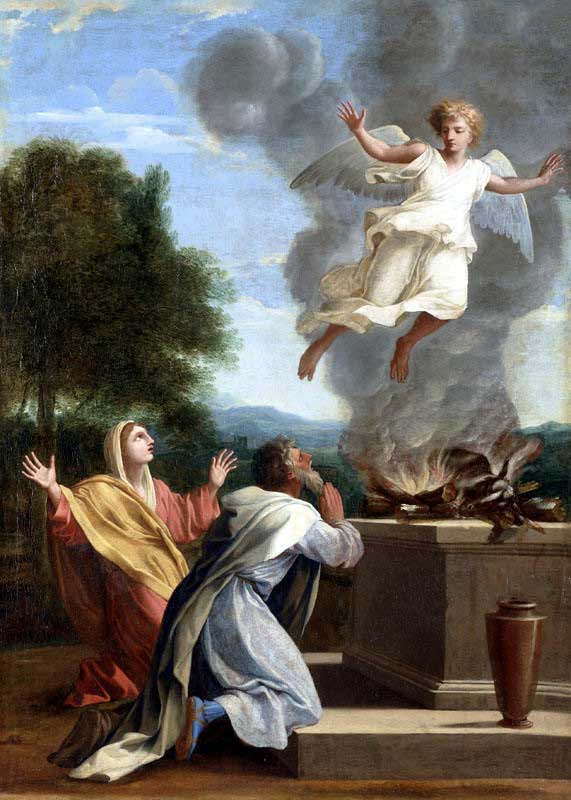
The Sacrifice by Manoah (c.1645), by Eustache Le Sueur
When the angel of the Lord appeared in Judges 13 to Samson’s father Manoah, a sacrifice was offered (a form of worship) and the angel ascended to heaven in the flame of the sacrifice (verses 19–20).
This signified that the angel accepted the sacrifice, which meant that He was not just an angel but God Himself.
Manoah said to his wife, “We are doomed to die! … We have seen God!” (Judges 13:22)
In the Brit Chadashah (New Testament), an angel rebuked the Apostle John who tried to worship him.
When John prostrated himself toward the angel’s feet to worship him, the angel said, “Don’t do that! I am a fellow servant with you and with your brothers and sisters who hold to the testimony of Yeshua (Jesus). Worship God!” (Revelation 19:10)
But, when the angel of the Lord accepts worship, as we saw in the stories of Jacob, Moses, and Manoah, we can be sure it was an appearance of God himself.
Angels can watch or patrol the earth and fight with demonic beings; God is the Captain of the Host of Armies.
In addition to being messengers, the archangel Michael can fight off high-ranking demonic forces (Daniel 10:12–13). Angels are also watchers (Daniel 4:13, 17) and some patrol the earth (Zechariah 1:10).
But there is someone who has placed Himself above all the angels.
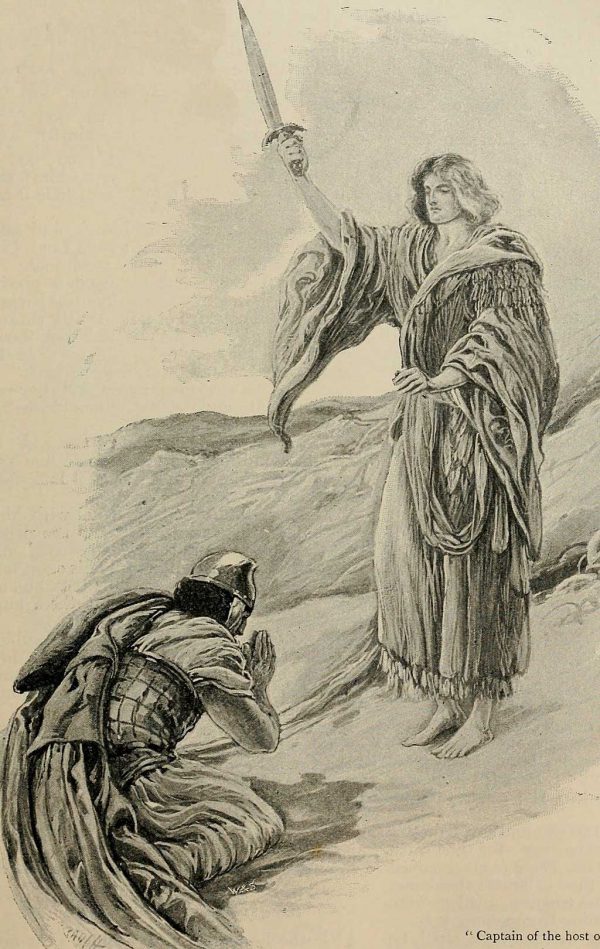
“Captain of the host of the Lord am I.” (1896), from The Art Bible, depicting Joshua 5:13–15.
As Joshua readied his troops to capture Jericho, he encountered another high-ranking leader — a man “with his sword drawn in his hand,” who told Joshua he was the “captain of the host of the LORD.”
Was this an appearance of God as the leader of the host of angels? One clue gives us a good idea that it was.
Joshua worshiped this man by falling to the ground on his face and bowing. An angel would not have allowed that.
Moreover, “the captain of the LORD’S host said to Joshua, ‘Remove your sandals from your feet, for the place where you are standing is holy.’ And Joshua did so.” (Joshua 5:15)
That’s exactly what God (YHVH) told Moses to do when He appeared in the burning bush (Exodus 3:5).
Angels observe and take an interest in the affairs of men; but in the end, they only know what they are told; God is omniscient.
Angels have been and will forever be involved and interested in what is happening in the lives of human beings, including you.
“There is joy in the presence of the angels of God over one sinner who repents.” (Luke 15:10)
Once saved, angels are sent as ministering spirits (Hebrews 1:14).
And they seem to serve as holy witnesses, as Yeshua said, “I tell you, whoever publicly acknowledges Me before others, the Son of Man will also acknowledge before the angels of God.
“But whoever disowns Me before others will be disowned before the angels of God.” (Luke 12:8–9; see also 1 Timothy 5:21; 1 Corinthians 4:9)

Angel observing mankind on earth.
Angels are limited in time and space; only God is omnipresent.
Angels are never seen in more than one place at the same time. In fact, they can be restrained by spiritual forces operating against them as when the angel was delayed 21 days fighting off the Prince of Persia (Daniel 10:13).
However, God is in more than one place at one time; He is Spirit and He can fill the whole universe if He chooses to.
As the Lord says, “Heaven is My throne and the earth is My footstool.” (Isaiah 66:1)

The Vision of Prophet Ezekiel (1883), by Julius Schnorr von Carolsfeld, depicts the chariot of God in Ezekiel’s vision, which represents the mobility of God’s Divine Presence.
Are They Theophanies or Christophanies?
While many theologians identify the appearances of the angel of YHVH and the angel of Elohim being that of God, others identify them as the pre-incarnate Messiah, which it turns out is in line with Jewish understanding.
Throughout Jewish literature and commentaries on the Holy Scriptures, the Sages and Rabbis had a difficult time believing that the infinite Creator could manifest in “bodily” form within His finite creation.
So, they wrote about these appearances as His Word, His Wisdom, and His Shekhinah Glory that manifested on His behalf.
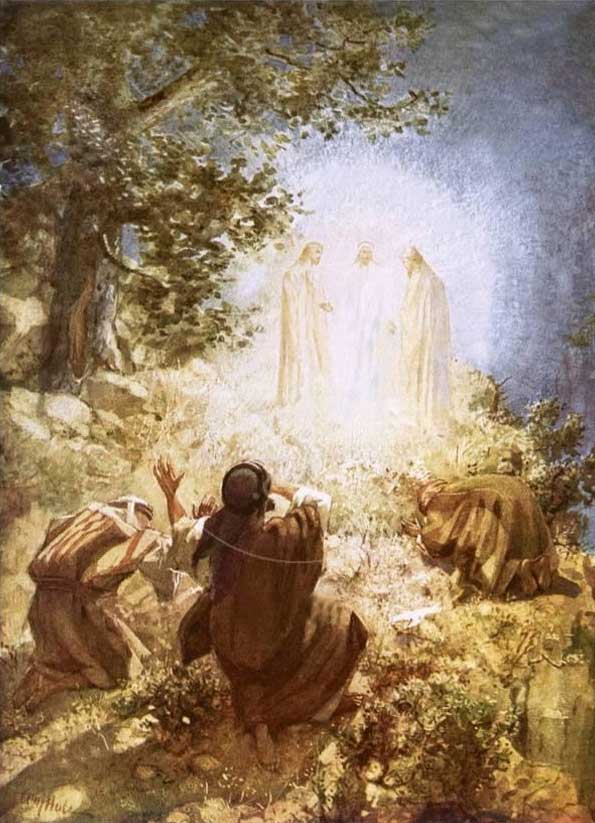
The Transfiguration, by William Hole, depicts the Shekhinah Glory of God emanating from Messiah Yeshua (Jesus).
Likewise, Messiah Yeshua is the Word (John 1:1) as well as the Wisdom of God (1 Corinthians 1:24) and the Shekhinah Glory of YHVH, which fully dwells in Him (Matthew 17:2).
In this line of Jewish thinking, then, it is possible that at least some of the theophanies are appearances of Messiah, known as Christophanies. And there is Scriptural evidence to support this.
In the story of Manoah, the angel of the Lord who rose up to heaven in the flame of worship and was identified as God said, “Why do you ask my name, seeing it is wonderful [pilee — פִלְאִי]?” (Judges 13:18)
Here, wonderful is the Hebrew adjective pilee. It derives from the same word that Isaiah uses about the child who would be called “Wonderful [pele — פֶּ֠לֶא] Counselor, Mighty God, Everlasting Father, Prince of Peace.” (Isaiah 9:6)
This is the description of the coming Messiah, who would be God in the flesh.

Angels were created to live for eternity and so were you.
If you have been born again in the Spirit of God through Yeshua, you have joined “thousands upon thousands of angels in joyful assembly,” praising and worshiping God forever. (Hebrews 12:22–23)







